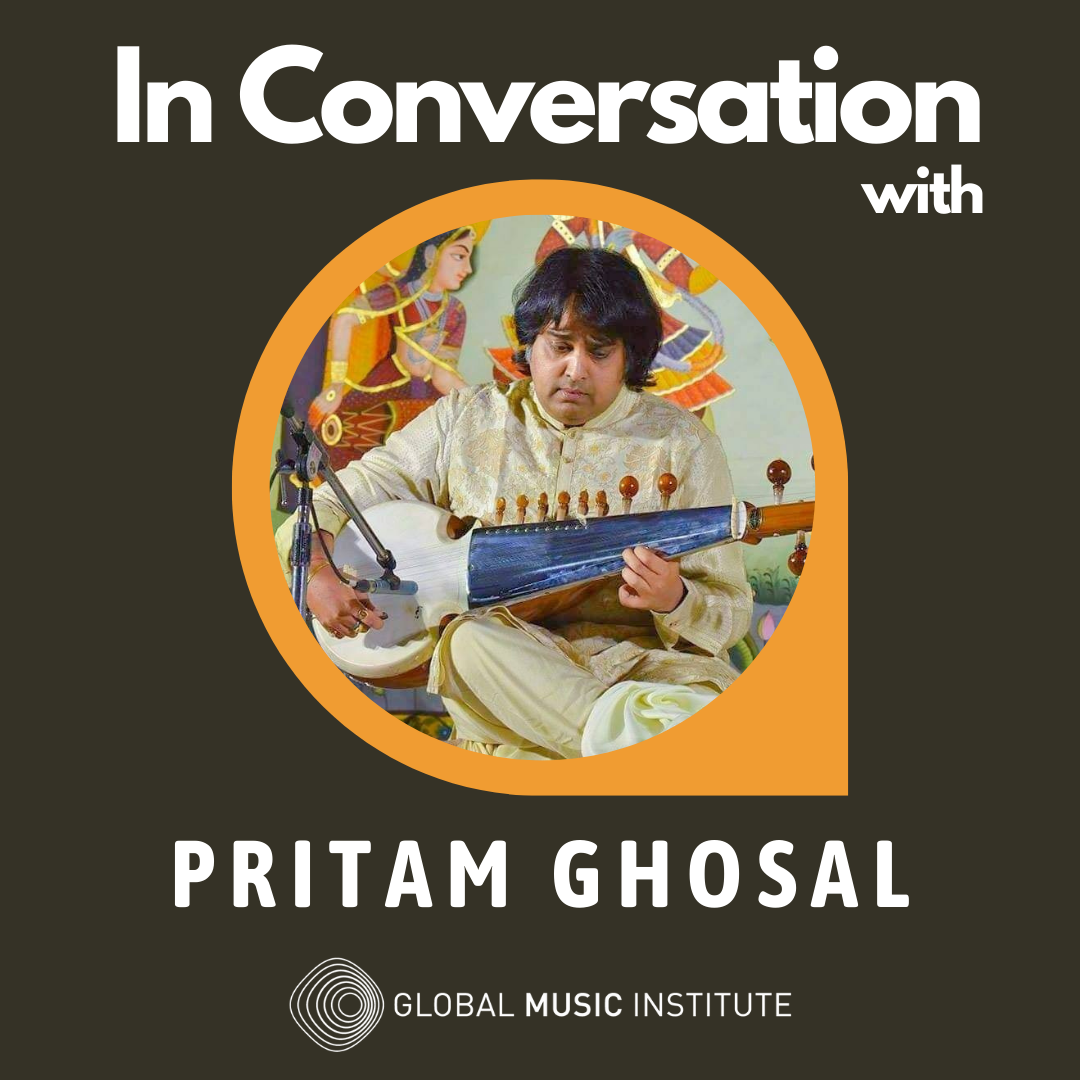
02 Jun In Conversation with Pritam Ghosal
The ‘In Conversation with’ series brings to you the stories of various creative professionals from the music industry and provides a glimpse into their journeys. Today’s conversation features the story of, and insights from revered sarod player and disciple of Ustad Amjad Ali Khan, Pritam Ghosal.
Early Beginnings
Born into a Bengali family in Kolkata, West Bengal, music is a gift Pritam Ghosal inherited from his family. Picking up the sarod upon his father’s insistence, for Pritam it was not love at first sight. Recalling his early years with the sarod he says, “one fine morning my father gave me the sarod and chose a guru who was from our locality. At that time I hated playing because I was more interested in playing cricket, football, and academics. I was not attached to that music at that point in time. My father pressured me a lot to sit down to practice and because of that, I started spending more time with the instrument. The underlying thing in life is that initially even if you don’t know a person, when you get to see more and know more of them, you start to fall in love and develop a liking towards them. Falling in love with the sarod happened in the same way.”
From reluctant beginnings to becoming an established sarod player, Pritam Ghosal’s relationship with the instrument continues to evolve. Speaking about his connection with the sarod he says, “you know what sarod is to me? It is like a family member. You can take liberty to go away from him or her, you can sit with her for hours and talk, keep quiet, eat, drink, you can take it for granted, you can quarrel, you can be angry, and you can be loving. It’s like a part of my everyday life. I don’t miss my sarod if I am not playing for ten days because it is always there. It is a part of me. If somebody thinks about me, they will think about me as a sarod player.”
(Pritam Ghosal- Ramkrishna Mission Golpark)
Ghosal’s father dreamed of his son learning sarod from the Hindustani classical music stalwart Ustad Amjad Ali Khan– a dream fulfilled in 1995 when he was accepted as a student of Ustad ji in a life changing moment after meeting him at a workshop in Kolkata. “References are very important in life. It is very important to have a reference and chase something. But who are you going to chase? Who are you aiming to sound like? When I heard my Guruji, my entire orientation changed. I saw a man who was immersed in music 24 hours a day. A man who talked and ate music. That kind of playing which until then was unthinkable for a boy like me changed my mind about the sarod. I chose sarod because of him. The music was so appealing- it touched my heart.”
Traditional Music for the 21st Century
A devoted disciple of his guru and a dedicated torchbearer of the tradition he is carrying forward, Ghosal is well placed to comment on the evolving role of a musician in the Indian classical music context. Speaking of the same he says “the context that we are living in today is completely different from how things were back then. Today life is fast. A musician is not only doing music– he is investing in a share market, editing, working in the studio and then going to perform at night. The socio-economic and socio-political situations are very different. People cannot be happy with just one thing. As a musician, the kind of music I play as a solo player and the music I play as a team member is very different. But both are important. Being in this age demands much more content and creativity from a musician because the audience has changed. There are audiences that want to be entertained and those who are there for the subject but for the musician, there has to be a midway and that is a very important thing.”
( Live at Triveni Auditorium: https://youtu.be/aw8Q7fdr4Js )
Asked about the need for the tradition of guru-shishya parampara to adapt to the needs of the modern day he says, “in this age, the meaning and dimension of guru-shishya parampara has changed. Back then, it meant to learn how Pandit Ravi Shankar and Ustad Ali Akbar Khan saab, and my guru learned by waking up and going to their guru’s place, and then doing riyaaz for eight hours. The guru would always be there listening and correcting them. They could totally surrender to the music and to the guru. But the world back then was not running so fast. In this context, my guru teaches differently. What he always says is that a musician in this age has to be an entertainer first. You have to draw a fine line between respecting tradition and entertaining your audience. Today I wish that a guru who is teaching can come up with modules that show you the midway of being an entertainer and following tradition so you are groomed in a way that you can approach any kind of music in the world.”
(Chaar Yaar at Sangeet Natak Academy, New Delhi)
Chaar Yaar
Well-versed in the art of solo recitals and performing collaboratively, Pritam Ghosal has been a long time member of the sufi music quartet ‘Chaar Yaar’. The quartet –comprising Ghosal, Dr Madan Gopal Singh, Deepak Castelino, and Ustad Amjad khan– have travelled the world performing compositions centered on verses by legendary sufi poets like Baba Bulleh Shah, Amir Khosrow, Shah Hussain, and Khwaja Ghulam Farid. A latecomer to the lineup, it did not take him long to create his own space in the group and make the music his own. “Prior to joining the group I was only playing solo concerts and did not have any experience playing with others. This was a very big challenge for me because the sarod is a very solo instrument. Instruments like sarod and sitar have always needed space. In sufi singing, one song is very lengthy because it explains many elements and it is very difficult for the performer of a sarod or sitar to come in.” Ghosal credits his long time friend Mithilesh Kumar Jha, a member of the original lineup of the group, for guiding him to adapt his instrument to a new musical context.
Lessons from a Disciple
Concluding our conversation by reflecting on his guru’s mentorship and the importance of challenging oneself as a student by going on stage, Ghosal says, “my guru is very happy with whatever I am doing and mostly that I am able to survive in a city like Delhi as a sarod player. He has supported me to no end. He reminds me that concerts are very important, and to not leave them behind. Unlike what is said of a lot of gurus in Hindustani classical music where they control your concerts by saying that you are not ready to play a concert, my guru has never restricted me. He has always said that there are two kinds of learning- one is inside the classroom and the other is on stage, facing the audience and challenging yourself. You have to learn how to manage the audience. If you are confident, go face the audience and learn from it. You will make mistakes- learn from it. Then your audience becomes your main guru. I would say that if a student can play even three or four notes confidently, they should play it and make people happy. Music is for everybody and with the basics of music- melody and rhythm, you can make a garland.”
Written by Senjuti



No Comments